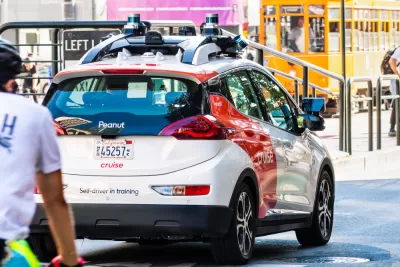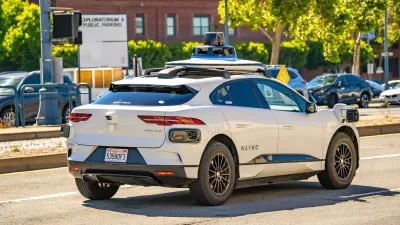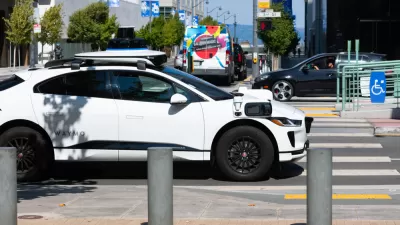In the worst version of the autonomous future, San Francisco firefighters have to fight off a self-driving car that crashed into their equipment during a fire, prompting calls for stricter regulations.

Incidents like a recent one in which San Francisco firefighters had to smash the window of a driverless Cruise car that plowed into an active fire scene highlight the need for stricter regulations on autonomous vehicles.
Writing in the San Francisco Chronicle, Ricardo Cano explains that the incident was just one of many. “In letters to the California Public Utilities Commission seeking to curtail their expansion, the city’s Municipal Transportation Agency and County Transportation Authority documented at least 92 incidents between late May and December where self-driving taxis created mayhem on city streets — disrupting traffic, Muni transit and emergency responders.”
The article details some of the Muni disruptions: “During the night of Sept. 23, five Cruise cars blocked traffic lanes on Mission Street in Bernal Heights, stalling a Muni bus for 45 minutes. On at least three different occasions, Cruise cars stopped on Muni light-rail tracks, halting service.”
According to Cano, “Last year, California regulators allowed Waymo to test its cars in San Francisco without a safety driver and gave Cruise permission to charge for driverless rides in roughly 30% of city streets between 10 p.m. and 6 a.m. — a time period when there’s less car and pedestrian traffic.”
But city regulators have repeatedly shown concern. “Their latest correspondence underscores the tension between agencies overseeing city streets and state-regulated autonomous vehicle companies under pressure to commercialize and prove their technologies work without incident.” San Francisco officials say they want the state to require more robust reporting of incidents and proof that the vehicles can operate effectively during rush hours before they can extend their operations.
FULL STORY: Map of SF shows where self-driving cars have caused ‘mayhem’

Maui's Vacation Rental Debate Turns Ugly
Verbal attacks, misinformation campaigns and fistfights plague a high-stakes debate to convert thousands of vacation rentals into long-term housing.

Planetizen Federal Action Tracker
A weekly monitor of how Trump’s orders and actions are impacting planners and planning in America.

San Francisco Suspends Traffic Calming Amidst Record Deaths
Citing “a challenging fiscal landscape,” the city will cease the program on the heels of 42 traffic deaths, including 24 pedestrians.

Defunct Pittsburgh Power Plant to Become Residential Tower
A decommissioned steam heat plant will be redeveloped into almost 100 affordable housing units.

Trump Prompts Restructuring of Transportation Research Board in “Unprecedented Overreach”
The TRB has eliminated more than half of its committees including those focused on climate, equity, and cities.

Amtrak Rolls Out New Orleans to Alabama “Mardi Gras” Train
The new service will operate morning and evening departures between Mobile and New Orleans.
Urban Design for Planners 1: Software Tools
This six-course series explores essential urban design concepts using open source software and equips planners with the tools they need to participate fully in the urban design process.
Planning for Universal Design
Learn the tools for implementing Universal Design in planning regulations.
Heyer Gruel & Associates PA
JM Goldson LLC
Custer County Colorado
City of Camden Redevelopment Agency
City of Astoria
Transportation Research & Education Center (TREC) at Portland State University
Jefferson Parish Government
Camden Redevelopment Agency
City of Claremont





























